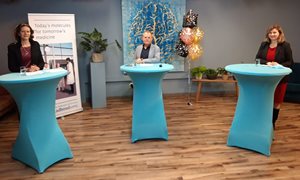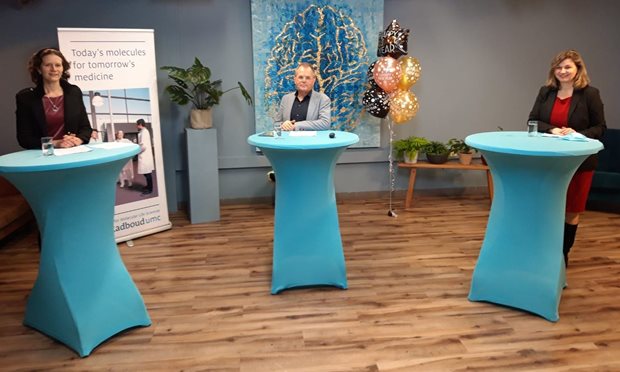
The Hanarth Fonds will finance the research projects of Iris Nagtegaal, theme Tumours of the digestive tract and Johannes Textor, theme Cancer development and immune defence. The fund aims to promote and enhance the use of artificial intelligence and machine learning to improve the diagnosis, treatment and outcome of patients with cancer.
Iris Nagtegaal: “CUP fight: detecting the origin of metastatic disease”
'Cancer of unknown primary sites (CUP) refer to all metastatic cancers where no primary location has been determined. This patient group accounts for 2.5% of all newly diagnosed cancer patients. The outcomes in this patient group are poor, because treatment is usually based on the primary location of the cancer. Even with the current improved diagnostic methods, ever year approximately 1,300 patients are diagnosed with CUP in the Netherlands. Their survival is less than 6 months. With artificial intelligence, we will explore big data in order to determine metastatic patterns of patients with a known primary location and develop a probability model based on metastatic location. We will subsequently incorporate routinely used biomarkers to optimize decision making, which we will test in a proof-of-concept study. As a result of our study we will deliver a prediction model that can be used in a prospective clinical trial to improve outcomes of patients with CUP.' read more
Johannes Textor: ''Transfer learning for immune cell landscape analysis in salivary gland cancer''
'Salivary gland cancer is a rare type of head-and-neck cancer with 150-200 diagnoses per year in the Netherlands, and the most aggressive subtypes have poor prognosis. To develop new treatment options, we are imaging the interactions between immune system cells and tumor cells within patient biopsies using high-resolution digital microscopy. Machine learning approaches are the state of the art for analyzing such data, but they can require very large datasets to train on, which are usually not available for rare cancer types. In our project, we will address this problem using "transfer learning" methodology that allows machine learning algorithms to benefit from experience gained on larger datasets from more common cancer types and train more effectively on smaller datasets. Leveraging existing data and knowledge in this manner, we hope that our project will help to build a rationale for future immunotherapy treatments for salivary gland caner patients.' read more
Related news items

RIMLS awards call for nominations
19 October 2021 RIMLS awards several prizes to stimulate and honor our (young) researchers. Upcoming awards are Supervisor of the Year, Best Master Thesis, Best Publication, Best Image and more. Send your nominations now before 24 November 2021. read more

RIMLS online award ceremony proudly presenting the winners
13 January 2021In this special webinar of the RIMLS New Year Celebration, scientific director René Bindels reviewed 2020 and looked forward to 2021. But more importantly a number of researchers received prizes in the traditional RIMLS awards ceremony.
read more
The Metastatic Microbiome rewarded with a Dutch Cancer Society Grant
24 September 2020 Annemarie Boleij, Iris Nagtegaal & Daniele Tauriello received the Dutch Cancer Society (KWF) Grant to explore the role of bacteria on colorectal cancer metastasis. read more
RIMLS PhD retreat registration is open
23 January 2020 Yearly, RIMLS PhD candidates gather for the two-day PhD Retreat. Apart from the science, this event is highly valued for the opportunity to meet and get to know fellow PhD candidates during the social activities. Early bird registration and abstract submission deadline: 4 March 2020. read more
Exploration meeting Academic Alliance on Oncology
2 December 2019 Within the Academic Alliance, the Maastricht UMC+ and Radboudumc are already working together in several areas. And this is happening in more and more fields. On 27 November researchers from both umc's met during the fourth Exploration meeting, this time with the theme: Oncology. read more
